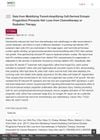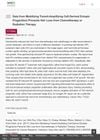 1 citations,
September 2020 in “Pediatric Dermatology”
1 citations,
September 2020 in “Pediatric Dermatology” Two teenage boys lost hair after taking a drug for growth, which was not a known side effect for kids.
 50 citations,
December 2010 in “Dermatologic Surgery”
50 citations,
December 2010 in “Dermatologic Surgery” Laser treatment can stimulate hair growth for male pattern hair loss.
 7 citations,
May 2014 in “Clinical practice”
7 citations,
May 2014 in “Clinical practice” Cooling the scalp may prevent hair loss from chemotherapy, hair often grows back after treatment, and nail issues usually improve after stopping the drug.
 2 citations,
April 2017 in “Molecular Medicine Reports”
2 citations,
April 2017 in “Molecular Medicine Reports” Blocking autophagy increases survival of inner ear hair cells exposed to gentamicin.
 24 citations,
November 2013 in “Trends in pharmacological sciences”
24 citations,
November 2013 in “Trends in pharmacological sciences” Increasing ABC transporters in hair follicles may prevent chemotherapy-induced hair loss.
 23 citations,
January 2021 in “Biomedicine & Pharmacotherapy”
23 citations,
January 2021 in “Biomedicine & Pharmacotherapy” DHT stops hair regrowth in mice, similar to human hair loss.
 19 citations,
July 2020 in “Journal of cancer survivorship”
19 citations,
July 2020 in “Journal of cancer survivorship” People undergoing chemotherapy need better support and information to cope with hair loss.

Activating certain hair follicle cells could prevent hair loss from cancer treatments.
 39 citations,
January 1994 in “European Journal of Cancer”
39 citations,
January 1994 in “European Journal of Cancer” Scalp cooling is largely ineffective in preventing hair loss from breast cancer chemotherapy.
 April 2024 in “Academic dermatology”
April 2024 in “Academic dermatology” Dermatologists should carefully manage hair loss in cancer patients to improve their quality of life.

Activating certain cells in hair follicles can prevent hair loss caused by cancer treatments.
 January 2023 in “Mastology”
January 2023 in “Mastology” Hormone therapy for breast cancer often leads to sexual issues like vaginal dryness and decreased libido.
 28 citations,
March 2017 in “Scientific Reports”
28 citations,
March 2017 in “Scientific Reports” Minoxidil may protect nerves and improve hair quality during paclitaxel treatment.
 July 2021 in “Open access journal of biomedical science”
July 2021 in “Open access journal of biomedical science” A lotion with natural extracts significantly sped up hair growth in women with hair loss from chemotherapy.
 8 citations,
April 2011 in “Surgery today”
8 citations,
April 2011 in “Surgery today” A substance called sodium zinc dihydrolipoylhistidinate can significantly reduce hair loss caused by chemotherapy in rats.
 19 citations,
October 2008 in “Journal der Deutschen Dermatologischen Gesellschaft”
19 citations,
October 2008 in “Journal der Deutschen Dermatologischen Gesellschaft” Anti-cancer treatments can cause reversible hair loss, skin sensitivity, pigmentation changes, nail damage, and skin reactions, with a need for more research on managing these side effects.
 2 citations,
November 2019 in “Skin appendage disorders”
2 citations,
November 2019 in “Skin appendage disorders” Platelet-rich plasma doesn't prevent hair loss from chemotherapy, and mononuclear cells only help against hair loss from one specific chemotherapy drug.

Hair follicles can be used to quickly assess drug effects in cancer treatment.
 November 2023 in “The journal of investigative dermatology/Journal of investigative dermatology”
November 2023 in “The journal of investigative dermatology/Journal of investigative dermatology” Cancer treatment drugs can cause permanent hair loss by damaging hair follicle stem cells, but a specific inhibitor might reverse this effect.
 53 citations,
April 2018 in “Journal of The American Academy of Dermatology”
53 citations,
April 2018 in “Journal of The American Academy of Dermatology” Cancer treatments often cause hair disorders, significantly affecting patients' quality of life, and better management methods are needed.
 January 2024 in “Journal of Ayurveda and integrative medicine”
January 2024 in “Journal of Ayurveda and integrative medicine” Millets may help reduce chemotherapy side effects like nausea, fatigue, and hair loss.
 June 2024 in “Frontiers in pharmacology”
June 2024 in “Frontiers in pharmacology” 2-deoxy-D-ribose gel may help regrow hair in cases of hair loss.
 30 citations,
July 2017 in “BioEssays”
30 citations,
July 2017 in “BioEssays” Activating NRF2 might help treat hair disorders by improving antioxidant defenses.
 August 2018 in “SDÜ SAĞLIK BİLİMLERİ DERGİSİ”
August 2018 in “SDÜ SAĞLIK BİLİMLERİ DERGİSİ” No method fully prevents hair loss from chemotherapy, but some methods can reduce it and improve quality of life.

Accurate diagnosis and tailored treatments are crucial for managing hair loss in humans and animals.
 8 citations,
January 2003 in “Pharmacotherapy: The Journal of Human Pharmacology and Drug Therapy”
8 citations,
January 2003 in “Pharmacotherapy: The Journal of Human Pharmacology and Drug Therapy” Chemotherapy may cause recurring hair loss due to an autoimmune response.
 9 citations,
September 2017 in “Journal of Investigative Dermatology Symposium Proceedings”
9 citations,
September 2017 in “Journal of Investigative Dermatology Symposium Proceedings” Prostaglandin D2 increases testosterone production in skin cells through a process involving reactive oxygen species, and antioxidants may help treat hair loss.
 1 citations,
January 2015 in “Springer eBooks”
1 citations,
January 2015 in “Springer eBooks” Chemotherapy can cause skin side effects that affect patients' lives, but they can be managed to avoid interrupting cancer treatment.
86 citations,
November 2020 in “Annals of Oncology” Early intervention and tailored management can reduce skin side effects from cancer treatments.
7 citations,
January 2013 in “Supportive care in cancer” Hair mass index is a precise way to measure hair loss in chemotherapy patients.




























